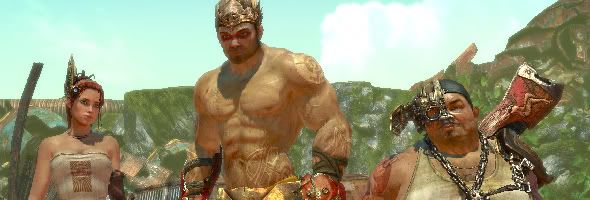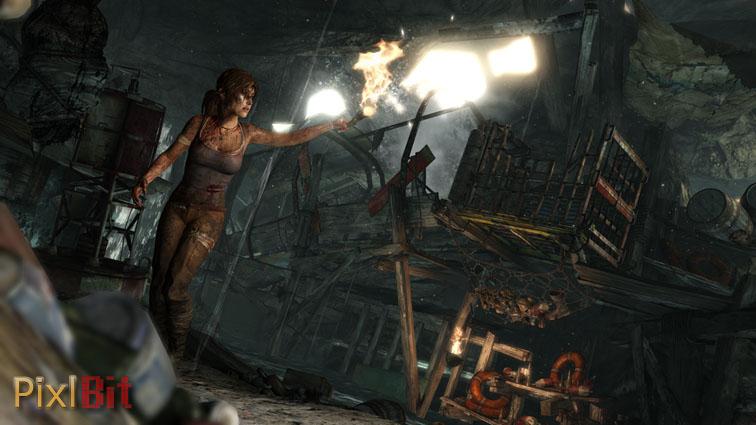The Future of Video Games: In Defense of the Sequel
|
|
On 04/19/2012 at 08:18 PM by Julian Titus See More From This User » |
This is part 3 of my Future of Video Games blog series that I wrote last year. I’m posting it at PixlBit to tie in with an upcoming episode of PixlTalk.
To kick off his part of the Nintendo E3 2011 press conference, President of Nintendo of America Reggie Fils-Aime had this to say:
“Look, we hear you. You want what you’ve always wanted. But you also want something new. You want to play things and things to look like they always have. But you want the buzz of the new. You want comfortable, and you want surprise.”
Say what you will about Nintendo as a company or Reggie as a spokesperson, but in this, he hit the nail on the head. Gamers, especially the hardcore vocal minority, are notoriously difficult to please. It’s the reason that I generally avoid forums at most websites. We’re never happy, are we? On one hand, we say we want new and exciting experiences, but on the other hand, we resist change at every step. I can only imagine how frustrating this must be for video game developers, who constantly have to walk a tightrope, lest they alienate the core of their fan base. This is made abundantly clear when both the consumers and the media get to talking about sequels, and it’s one of my biggest gripes with the coverage of video games as a whole. So, in part three of my “Future of Video Games” series, I’m going to stand up in defense of the sequel.
Good Things Come in 3s
Even though there were two new and exciting pieces of hardware unveiled at E3 this year (the PlayStation Vita and Nintendo Wii U), it was definitely a software show. Tons of new games were announced and shown this year, and the vast majority of them were sequels. Just off the top of my head, I can name Uncharted 3, Mass Effect 3, Battlefield 3, Call of Duty: Modern Warfare 3, BioShock Infinite, and Darksiders 2. That’s a lot of games with numbers in their titles, for sure. On the other hand, I’m hard-pressed to name off any original titles that were shown at this year’s expo.
I don’t consider this a negative, however. In fact, besides Battlefield and Call of Duty (games I don’t play), I couldn’t be happier at the list of returning franchises listed above. I didn’t even mention notable series reboots like Crystal Dynamic’s new take on Tomb Raider, or Ninja Theory’s bold ideas for Devil May Cry. I’m excited for all of these games, and why wouldn’t I be? These games were all incredible in their previous releases, and everything points to their successors being just as amazing, if not more so.

Who wouldn't want some more of Uncharted?
This is something that sets the video game industry apart from the movie industry. With movies, sequels often stem from a pure money grab. You may have a film perform well beyond expectations (i.e. The Hangover), and a lot of pressure is put on the writer or director to develop a sequel, even if the original wasn’t conducive to a second story (i.e. Pitch Black). Oftentimes, even if a movie was written with a follow-up in mind, the sequel simply can’t live up to the original. Not so with video games, which are often planned as launching points for franchises from the get-go. Since many original IPs involve so much time to create the worlds, characters, backstory, and play mechanics it is not uncommon for a brand new franchise to start off a little shaky. It can be easy to see what the developers were going for, but sometimes things just don’t come together the way they had hoped. But once all that preliminary work has been done and the foundation is set, the design teams are able to iterate and build on that foundation, coming up with a game that is far superior to the previous one. This can certainly be said for Mass Effect, Assassin’s Creed, and Fable. Each one of these games feature some major flaws, but their direct sequels improve upon the originals in nearly every way.
Coming out of E3, it seemed like every member of the enthusiast press and every hardcore gamer was complaining about the glut of sequels. It speaks to a deeper problem to me, namely the prevailing jaded attitude that seems to be systemic amongst gamers. It’s a sentiment that I don’t share, and actively try to combat whenever I can. Sure, I can understand some franchise and/or genre fatigue; I myself came away from the E3 coverage feeling like I could do without a first person shooter for a couple years. And with a new Call of Duty game released every November for the past six years, it doesn’t surprise me that some people are getting a little burned out on the series. But the sequels at E3 this year were by and large impressive showings, and oftentimes displayed a level of craftsmanship and technical prowess that can only come from the skills accumulated working on past entries of a franchise.
You Don’t Really Want New Titles, Do You?
“Well, sure, Julian, those games you mentioned all look great. But where were the brand new games at E3? It’s just the same stuff over and over again!”
That’s a good point. There was certainly a dearth of new titles shown this year, but it was kind of to be expected. We’re right on the edge of a new console generation. Most likely by the holiday season of 2013 all three of the console makers will have their new machines on the market. With new hardware comes new, original games and ideas, but right now is the time for getting that one last entry in a franchise onto the current consoles. Oh, we’ll probably see some new games in the next year, as the 360 and PS3 won’t be going anywhere for a long time. After all, God of War came out the same year that the 360 launched, and it became one of Sony’s flagship titles.
But you don’t really want new titles, do you? Oh, sure, you say you do, but sales figures show a much different story. Consider that, last year, we had a veritable treasure trove of new, original IPs debut. 2010 saw the release of Bayonetta, Darksiders, Alan Wake, Enslaved, and Vanquish, just to name a few. These games are all worth playing, but most of them were total failures at retail. This is nothing new; as a former video game retailer I can remember how hard I tried to push new, interesting games like Beyond Good & Evil, Ico, Otogi, and others with no results. It was much easier to sell the newest Grand Theft Auto, Devil May Cry, or Metal Gear game, because those were known quantities.

Enslaved had one of the best stories of 2010. It also tanked.
We’re all to blame on this one. As consumers, we say that we want new and fresh games, but when it comes time to plunk our hard-earned money down on a 60 dollar title, we opt for the tried and true. Even as game reviewers complain about the sequel-centric nature of the industry, they tend to not prop up brand new, interesting titles, because as mentioned earlier, the first entry of a new series is nearly always rough around the edges, and this shows up in review scores. Personally, I go out of my way to pick up those flawed gems, but I know not everyone can afford to do this. But you can’t have it both ways. You can’t complain about a lack of new content on store shelves and then pass on an original title because you only have money for the next game in the (insert your game here) franchise. If you really want to do something about the lack of originality in this hobby, go out and spend that money on the Mirror’s Edges and Catherines of the world. Buy Call of Duty second hand after the price has dropped. Activision doesn’t need your money-they do just fine without you. But smaller studios like Platinum, Remedy, Double Fine and Atlus need all the support they can get.
Innovation is all Around You
Okay, so we’re seeing more sequels than ever these days. It’s hardly surprising, with the rising costs of game development and successful games selling in record numbers. You can’t really blame developers and publishers going where the money is. That’s their job, after all. Hardcore fans will talk endlessly about the lack of innovation in video games today, but innovation is everywhere; you just have to look closely for it. Call of Duty 4 added the RPG-like perks and prestige system to its online multiplayer, which rendered other FPS multiplayer features nearly obsolete. Halo 3 brought an unprecedented level of stat tracking and player replays to video games. The Uncharted series is doing things with physics and animation that has raised the bar on what gamers expect from triple-A game design. Looking forward to some of the sequels on the horizon, I think the new Tomb Raider is going to bring a level of reality and believability to Lara Croft that could be a game changer. Mass Effect 3 is looking to finally get that perfect blend of role playing and action that has been just out of BioWare’s reach since the release of the first game in 2007. Hitman: Absolution hopes to combine the freedom of choice the series has been known for with the polish and scope of the Assassin’s Creed series, something that should get virtual killers-for-hire excited everywhere. We may not be getting drastic change in all of these sequels, but with each one we’re getting incremental improvements that find their ways into all aspects of gaming. That means that video games are getting better overall, and isn’t that something to be lauded? And that sequel you groaned about when it was announced? It was the new kid on the block at one time, too.

The new Tomb Raider might make history...by making Lara Croft human.
So, praise be to the sequel! It’s going to be a great year and a half for new entries in established franchises, and after that we’ll be looking forward to the next big innovators for the new consoles. And those games are going to look incredible. Join me tomorrow as I talk about my take on the future of video game graphics.



Comments